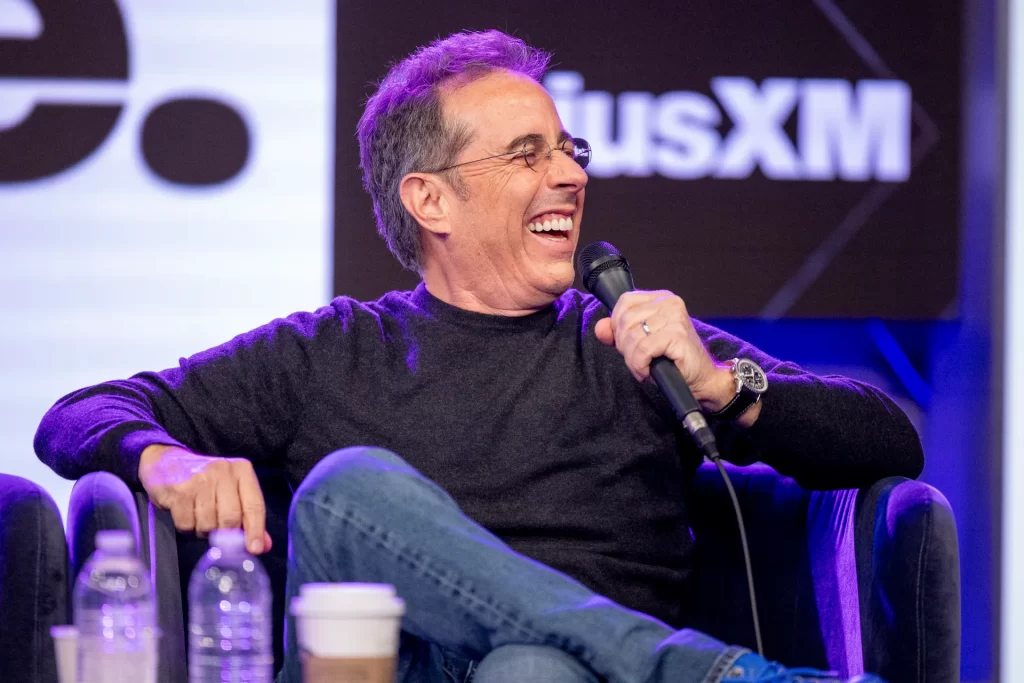Jerry Seinfeld Reflects on Comedy and Cultural Changes: A Change of Heart
3 min read

Comedian Jerry Seinfeld has recently retracted his earlier statements suggesting that the “extreme left” is stifling comedy. In an interview with The New Yorker earlier this year, Seinfeld expressed nostalgia for a time when television offered a wealth of humorous programming, citing shows like “Cheers,” “MAS*H,” and “All in the Family.” He lamented the current cultural climate, attributing it to the pressures of political correctness and concerns about offending audiences.
In that April interview, Seinfeld noted, “It used to be you would go home at the end of the day and expect to find something funny to watch on TV. Well, guess what – where is it? This is the result of the extreme left and P.C. crap.”
However, during a recent episode of the Breaking Bread podcast with comedian Tom Papa, Seinfeld acknowledged that he “got it wrong” in his previous comments. He clarified that it is “not true” that the extreme left has suppressed comedy. Seinfeld also addressed misconceptions about his reluctance to perform at colleges, stating, “Not true… I never said it… I play colleges all the time.”
Seinfeld explained that comedians must adapt to cultural shifts, much like champion skiers navigate courses set on a mountain. “If you’re Lindsey Vonn, you can put the gates anywhere you want on the mountain – she’s gonna make the gate. That’s comedy,” he said.
He emphasized that comedians must respond to the cultural landscape, remarking, “Whatever the culture is, we make the gate. If you don’t make the gate, you’re out of the game.” Seinfeld acknowledged that while cultural changes may limit certain expressions, the essence of comedy requires precision and adaptability. “Does culture change? And are there things I used to say that I can’t say?… Yeah. But the accuracy of your observation has to be a hundred times finer than that to just be a comedian.”
The comedian reiterated that his role is not to pass judgment on cultural norms but to engage with them. “I don’t think the extreme left has done anything to inhibit the art of comedy. I’m taking that back now officially. They have not. Do you like it? Maybe, maybe not – it’s not my business to like or not like where the culture is at,” he explained. “It’s my business to make the gate. You make the gate or you’re out.”
Seinfeld acknowledged the difficulty of creating comedy, stating, “Comedy is hard. Big, giant period … You want to make a fabulous living making people giggle? That sure sounds great – it’s gonna take a lot.” His comments reflect the challenges comedians face in navigating today’s complex cultural environment.
In addition to discussing comedy, Seinfeld addressed his earlier remarks regarding the perceived decline of “dominant masculinity” in the United States. He admitted that his phrasing was “probably not the greatest,” clarifying that he was reminiscing about the “big personalities” of his youth, such as Muhammad Ali and Sean Connery.
“These were all the people I wanted to be like as a kid… I wanted to have that kind of authority and style,” he said. Seinfeld lamented a trend of conformity aimed at avoiding offense, which he believes has diluted the vibrant personalities he admired growing up.
While he did not intend to evoke notions of toxic masculinity, he did express a fondness for larger-than-life figures, stating, “We don’t need the toxic part, but the big personalities are fun.” This reflection underscores Seinfeld’s appreciation for the charisma and individuality that characterized public figures in his formative years.
Overall, Jerry Seinfeld’s latest reflections reveal a willingness to adapt to evolving cultural norms while asserting the enduring challenges of crafting effective comedy. By acknowledging his earlier missteps, he opens up a dialogue about the balance between artistic expression and societal sensitivities.
As comedy continues to evolve in the face of cultural shifts, Seinfeld’s insights resonate with both comedians and audiences alike, reminding us that while the landscape may change, the fundamental principles of humor endure.